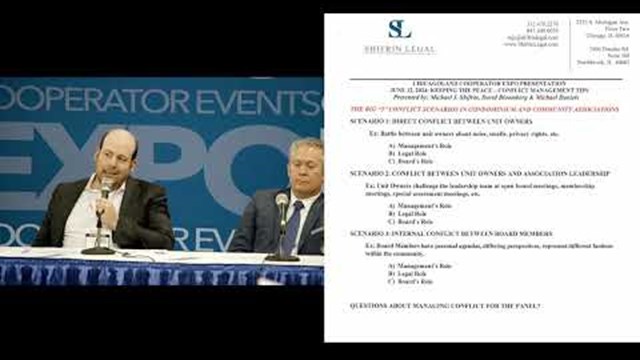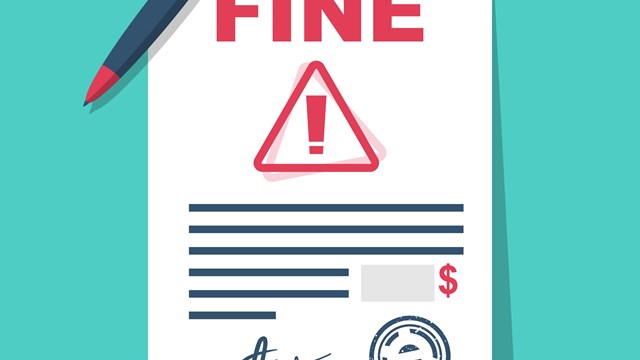Each multifamily building or association establishes a set of rules and regulations that residents and their guests must follow to uphold a safe and harmonious community. Often these address pet, noise and odor regulations, trash disposal, recycling, move-out/in times, deliveries, allowable time frames for construction work, and what kinds of décor is permitted in shared or visible locations.
In some cases, they are an expansion or clarification of the existing bylaws. Although adhering to these rules benefits everyone, some individuals may choose not to comply, leaving it to boards and management to handle such situations when they arise.
A Matter of Duty
The board has a fiduciary duty to enforce the association’s documents,” says attorney Mark R. Rosenbaum of Chicago-based law firm Fischel & Kahn, Ltd. “You should review your association documents and rules to determine the mechanism to trigger a formal review of any problems you are having. Whatever the process, it should require the board and/or managing agent to at least investigate the issues and make a determination as to whether further action is needed. Such formal action could range from fines to—in especially severe cases—forced sale of the [offending] neighbor.”
For non-board residents chafing against a neighbor’s rule-flouting, Rosenbaum notes that if an association or its management is unwilling to address a rule-breaker, “You may still have some options. Depending on the state and/or city in which you live, there may be a governmental administrative agency to whom you can take complaints relating to association governance. You may further have a claim against the association and/or the board members for breach of fiduciary duty for its/their failure to enforce the association documents/rules. But again, such a claim can be lengthy and expensive to fight.”
However, Rosenbaum is quick to note, “At least in Illinois, one thing you cannot do is refuse to pay your assessments until the association addresses the issues you have raised. The Illinois courts have made it clear that the obligation to make payment of assessments is independent of virtually all other issues you, as an owner, may have with the association.”
House Rules vs. Bylaws
Mariel Mercado-Guevara, an attorney at Coffey Modica LLP in White Plains, New York has spent parts of her legal career assisting HOA associations with enforcement and collections actions against homeowners. She explains an HOA’s rules come from the governing documents of the association at formation by the developer, once it turns over control of the community to the HOA.
“The HOA is run by an elected board of directors, which has the power to implement additional rules,” she says. “Also, local, state, and federal government bodies often pass new laws that may create or alter regulations that are set by your association. Depending on the bylaws, board members may unilaterally pass, amend, or repeal the rules. Residents are encouraged to attend their association’s general meetings to hear what rules, if any, are changing and to voice their opinions or concerns regarding the rules.”
At the association’s meeting, a resident may express any concerns or changes in the rules. A resident may present a new rule or propose changes to the rules to the board of directors who may take that into consideration at the association meeting.
Jaime Sikorski, senior vice president, management at AKAM, which offers property management services in New York City, notes if the building is a co-op, the bylaws primarily govern how annual meetings are run and set the rules for boards and their office positions. If the building is a condo, the bylaws govern all aspects of the building including legal, annual meetings, and more.
“The main difference is that house rules can typically be amended or edited by the board of directors/managers, whereas bylaws must be amended by a super-majority vote of all owners/shareholders,” Sikorski says. “This allows the board to adapt the house rules to best serve the needs and interests of the residents, and flex with the culture of the property.”
The managing agent will have a copy of these documents on file. If the building has an online portal, these documents are uploaded to the libraries of the platform to be easily made available to owners and shareholders. As the house rules are amended, notice is sent to stakeholders in accordance with the governing documents.
Enforcing House Rules
If permitted by the proprietary lease or bylaws, boards can fine and/or penalize residents who do not follow the house rules, particularly if the violation is repeated or considered an egregious act.
“If the issue is serious enough, the board may engage legal counsel,” Sikorski says. “Often, there is an overlap between the governing documents and house rules, therefore, violations may also breach the bylaws/proprietary lease.”
When someone disregards or violates a rule, Sikorski notes the first step should be to speak with the resident and ensure they are familiar with the house rules and have a copy, which would be noted as a record of conversation.
“In many cases, this will mitigate the issue without further incident,” she says. “If the resident continues to disregard a rule, a formal letter should be issued which includes reference to the verbal conversation, the continued action resulting in the violation, as well as potential recourse should the behavior not cease.”
Continued and repeated incidents of the resident violating the same house rule following these two actions typically result in the resident being fined, penalized, or the issuance of a legal letter.
“Fines are a tool in the toolbox to compel a change in behavior,” says Brian Butler, President of Property Management with FirstService Residential in Chicago. “Most buildings we manage have some fines. It could be as simple as a late fee on monthly common charges, or something hefty on lease restrictions like Airbnb violations. These fines and fees are generally found in the association’s or corporation’s house rules—not in the governing documents. The dollar amount of the fine is at the board’s discretion. They can amend house rules when necessary, and can have ranges and categories for different fines.”
Butler agrees, and adds: “There has to be enough investigation to support the fine. You can’t just do it on suspicion. And that’s where boards can get in trouble. You need concrete evidence. Cigarettes thrown off a balcony and landing on another balcony or terrace can cause a fire. But you don’t have proof as to who threw the cigarette butt off their balcony in the first place. It’s unlikely that residents will agree to undergo DNA testing to determine who the perpetrator is.” However, Butler does mention one association he knows of that requires all residents to have their pets’ DNA registered with the building in the event of a ‘walkies’ mishap, so that the building management can identify the perpetrator through pet-poop forensics.
One big factor recently in play when it comes to fines is short-term rental platforms like Airbnb, which have experienced varying levels of resistance in many cities nationwide. Some destinations—including Chicago—have enacted more or less strict prohibitions against Airbnb rentals. In response, many communities—particularly co-ops, which have more authority over owners than condominiums—have enacted rules to eliminate short-term vacation rentals from their buildings and complexes entirely.
Butler points out that the effectiveness of fines in this specific situation is one of dollars and cents. “Over the last several years [renting one’s unit] via Airbnb has become the most finable event we see. But the money made through the Airbnb rental may be so substantial for the owner that the fine becomes just part of the cost of doing business. The fine has to be so onerous—and perhaps other punitive measures must be employed as well—so as to make continuing the behavior untenable for them.”
But the pros stress that there should be at least a few overtures to the offending resident before the fines start flying. “When someone is not in compliance, we like to start with a courtesy call and reminder of the rule,” notes one property manager based in Evanston, Illinois. “If the rule continues to be broken, we will then need to issue an official warning letter. The letter will advise of the infraction, the authority the association has in terms of fine, and the fine process. A final letter advising of the fine via certified mail is the final step.”
Mercado-Guevara says when collecting delinquent fines and pursuing legal actions, the board or manager must ensure that the HOA adheres to both state laws and the Fair Debt Collection Practices Act to ensure fair and ethical treatment of homeowners.
Taking Legal Action
While a vast majority of residents in HOAs comply with the house rules, there is often enough that “special someone” who thinks they do not need to follow the rules. Fines and suspension of privileges typically motivate a resident to fall into compliance, but if not, then it’s time to call in for legal help.
“A lawyer should get involved when fines and suspension of privileges have no effect, and it depends on the severity of the violation,” says David Dockery, an attorney with Becker & Poliakoff in Morristown, New Jersey who specializes in community associations. “Generally, I am asked to be involved when the owner is willfully violating the rules. Many times, I will continue what the board has been doing but bring it to the next level. If that does not work, an association can bring a court action to seek injunctive relief against an owner, with the owner being required to pay the legal fees, if authorized in the bylaws.”
If the court action is successful, the court can hold the owner in contempt of court if they do not comply, which may mean arrest, financial sanctions, or the ability of the association to enter the unit and take remedial measures when the owner has failed to do so.
“However, before such a court action can be brought, the association needs to make sure the rule is reasonable, lawful, and does not exceed the authority under the governing documents,” Dockery says. “Care also needs to be taken in many jurisdictions which have laws that may supersede an association’s ability to pass a rule. For example, at the federal level, an HOA cannot prohibit the display of an American Flag, but they could possibly enforce the size and location, i.e. it cannot be so large to be draped over the entire side of a building.”
Legal Liability
As a threshold issue, rules should not be enforced arbitrarily, but the law and many bylaws provide in most jurisdictions that the board has a certain amount of discretion and leeway as to enforcement, but Dockery notes under no circumstance can that discretion be discriminatory.
“There is always the chance that a board could face an accusation of breach of fiduciary duty for failure to enforce a rule,” he says. “As to whether a manager can be liable for not carrying out enforcement of a rule, it is uncommon as the manager is an agent of the board and acts under their direction. However, there could be circumstances where a manager could be liable if such actions are discriminatory, contrary to the board’s direction, or cause harm to the owner.”
Rules are great to have, but many times the devil is in the details as to the best method of enforcement and applicability. Most residents do not want to feel they live in a police state by being subjected to overzealous enforcement, but on the other hand, many residents appreciate reasonable enforcement of the rules as one of the reasons they buy into an HOA in the first place.
Keith Loria is a freelance writer and contributor to CooperatorNews Chicagoland.










Leave a Comment